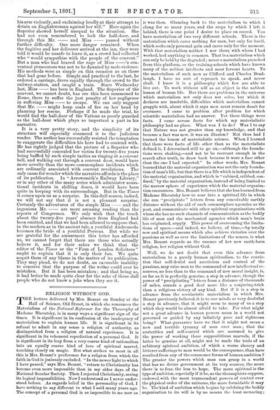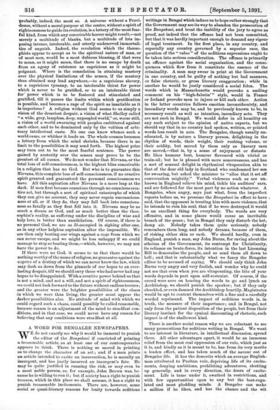RELIGION WITHOUT GOD. T HE lecture delivered by Mrs. Besant on
Sunday at the Hall of Science, Old Street, in which she renounces the Materialism of the National Reformer for the Theosophy of Madame Blavatsky, is in many ways a significant sign of the times. It is significant in its confession of the inadequacy of materialism to explain human life. It is significant in its refusal to admit in any sense a religion of authority, as distinguished from a religion of natural experience. It is significant in its vehement repudiation of a personal God. It is significant in its leap from a very coarse kind of rationalism into an equally coarse kind of love of spiritual marvel, touching closely on magic. But what strikes ns most in all this is Mrs. Besant's preference for a religion from which the faith in God is jealously excluded. "In the newer light to which I have passed," says Mrs. Besant, " return to Christianity has become even more impossible than in my older days of the National Secular Society. Then I rejected Christianity, seeing its logical impossibilities. Now I understand as I never under- stood before. As regards belief in the personality of God, I have nothing to say different to what I said many years ago. The concept of a personal God is as impossible to me now as
it was then. Glancing back to the materialism to which I clung for so many years, and the steps by which I left it behind, there is one point I desire to place on record. You have materialism of two very different schools. There is the materialism which cares nothing for man, but only for itself, which seeks only personal gain and cares only for the moment.
With that materialism neither I nor those with whom I had worked, had anything in common. That is a materialism which can only be held by the degraded ; never a materialism preached from this platform, or the training-schools which have known many of the noblest intellects and most fervent hearts. To the materialism of such men as Clifford and Charles Brad- laugh, I have no sort of reproach to speak, and never shall. I know it is a philosophy which few are able to live out. To work without self as an object is the noblest lesson of human life. But there are problems in the universe which materialism not only does not solve, but which it declares are insoluble, difficulties which materialism cannot grapple with, about which it says men must remain dumb for evermore. I came to problem after problem for which scientific materialism had no answer. Yet these things were facts. I came across facts for which my materialistic philosophy had no place. What was I to do P Was I to say that Nature was not greater than my knowledge, and that because a fact was new, it was an illusion P Not thus had I learned the lesson of materialistic science. When I learned that there were facts of life other than as the materialists defined it, I determined still to go on,—although the founda- tions were shaking,—and not to be recreant enough in the search after truth, to draw back because it wore a face other than the one I had expected." In other words, Mrs. Besant learned that the material organisation was not the only founda- tion of man's life, but that there is a life which is independent of the material organisation, and which is " cabined, cribbed, con- fined," by the material organisation, instead of being limited to the narrow sphere of experience which the material organisa- tion encounters. Mrs. Besant believes that she bas learned from Madame Blavatsky how to soar into a spiritual life in which she can " precipitate " letters from any conceivable earthly distance without the aid of such commonplace agencies as the post, and communicate with other spiritual organisations with whom she has no such channels of communication as the bodily life of man and the mechanical agencies which man's brain has originated, supply. This power of overcoming the limita- tions of space,—and indeed, we believe, of time,—by totally new and spiritual means which also achieve victories over the passions as well as over the limitations of the senses, is what Mrs. Besant regards as the essence of her new earth-born religion, her religion without 'God.
Well, we do not doubt that even this advance from materialism to a purely human spiritualism, to the convic- tion that self-denial and asceticism and control of the passions, may raise man to the command of new intellectual re- sources, no less than to the command of new moral insight, is, so far as it is perfectly genuine, a step in advance, though the power of "precipitating " letters from a distance of thousands of miles, sounds a good deal more like a conjuring-trick than a religious victory of any kind. But if it is a step in advance from the secularistic materialism in which Mrs. Besant previously believed, it is to our minds so very doubtful a step in advance, that it might seem to many of us a step which they would be almost afraid to take. For what might not a great advance in human powers mean in a world not governed or guided by any infinitely pure and righteous being ? What guarantee have we that it might not mean a new and terrible tyranny of man over man ; that the austerities and self-control which are assumed to give the power of working these supposititious marvels, if the latter be genuine at all, might not be made the tools of an arbitrary spiritual ambition, of which a worse slavery and bitterer sufferings to man would be the consequence, than have resulted from any of the commoner forms of human ambition P The greater the powers which man can grasp in a world that has no divine government at its very sources, the more there is to fear, the less to hope. The more spiritual is the type of ambition, especially if it be, as the theosophists suppose, endowed with the most transcendent powers of control over the physical order of the universe, the more formidable it may be. The kind of ambition which begins by subduing the bodily organisation to its will is by no means the least menacing ;
probably, indeed, the most so. A universe without a Provi- dence, without a moral purpose at the centre, without a spirit of righteousness to guide its evolution, is a lottery of the most fear- ful kind, from which any conceivable horror might result,—not merely a multitude of blanks, but a multitude of lots im-
posing intense, intolerable, and utterly undeserved immortali- ties of anguish. Indeed, the revelation which the theoso- phists appear to accept as to the spiritual nature of man, or of most men, would be a most dubious blessing, if that were to mean, as it might mean, that there is no escape by death from an agony of existence as capricious as it might be poignant. Where is the consolation in attaining mastery over the physical limitations of the senses, if the mastery thus obtained may lead anywhere,—to a capricious slavery, to a capricious tyranny, to an intolerable thirst for power which is never to be gratified, or to an intolerable thirst for power which is to be fostered and stimulated and gratified, till it passes the limits within which gratification is possible, and becomes a rage of the spirit as insatiable as it is imperious ? A religion without God seems to us simply a vision of the dreariest despair, a vision of what Shelley called " a wide, grey, lampless, deep, unpeopled world," or, worse still, a vision of a world swarming with peoples embittered against each other, and to be dominated only by the volition of arbi- trary intellectual caste. No one can know whence such a world came, or whither it leads us. The whole cosmos becomes a lottery from which the mind shrinks, because there is no limit to the possibilities it may send forth. The highest prize may tarn out to be the most fearful sentence. The power -gained by austerity over the senses may prove to be the .greatest of all curses. We do not wonder that Nirvana, or the total loss of self-consciousness, is the highest bliss conceivable in a religion that has no God. But who is to guarantee this Nirvana, this complete loss of self-consciousness, if no creative spirit granted and guaranteed the personal consciousness we have. All this aspiration after Nirvana is a mere leap at the dark. If men first became conscious through no conscious crea- tive act, but through a sort of spiritual catastrophe of which they can give no account, they may never regain unconscious- ness at all, or if they do, they may fall back into conscious- ness as fatally as they first fell into it. Nirvana may be as much a dream as God, and as much better than the theo- sophist's reality, as suffering under the discipline of wise and holy love, is better than annihilation. Of course, if there is no personal God, we are as ill-occupied in sighing after one, as in any other helpless aspiration after the impossible. We are then only beating our wings against a cage from which we can never escape, and we might be less unhappy if we could manage to stop so beating them,—which, however, we may not .have the power to do.
If there were no God, it seems to us that there would be nothing worthy of the name of religion, no guarantee against the 'caprice of a destiny of which we can never know the law, which may dash us down from the pinnacle of our hopes to an ever- lasting despair, till we should envy those who had never had any hopes to be disappointed. With a creative power behind us that is not a mind, and not a will, and not a spirit of righteousness, we could not look forward to the future without endless terrors ; and the greater were the brighter possibilities of the chaos an which we were thus living, the greater must appear the darker possibilities also. No attitude of mind with which we
• could regard such a chaos, could possibly be called reasonable, because reason is an adjustment of the mind to steadfast con- ditions, and in that case, we could never have any reason for believing that any conditions were steadfast at alL



































 Previous page
Previous page